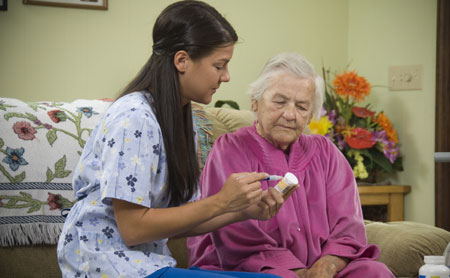Language Training for Home Care Workers: Speaking Your Client’s Language
 Being multilingual in today’s professional world is no longer simply an asset; it’s on the verge of becoming necessary. With an immigrant population of over 42.4 million people as of 2014, the United States workforce will need to become fluent in multiple languages in order for businesses to reach every last inch of the population. In the long list of industries that would benefit from multilingual workers, Home Care is among one of the biggest.
Being multilingual in today’s professional world is no longer simply an asset; it’s on the verge of becoming necessary. With an immigrant population of over 42.4 million people as of 2014, the United States workforce will need to become fluent in multiple languages in order for businesses to reach every last inch of the population. In the long list of industries that would benefit from multilingual workers, Home Care is among one of the biggest.
Home care is one of the fastest growing industries in the U.S. today – projected to grow around 6.7% between 2016 and 2021. As the population ages, more people will turn to some form of home aid to support them, and due to increasing immigration, many of those people will require assistance from multilingual home care workers. As such, one can expect health care agencies to be placing more emphasis on workers who can speak more than one language.
Why is there a Need for Multilingual Home Care Workers
 Home care service agencies hire home care workers to help elderly people in their homes; however, elderly people that speak a language other than English at home tend to be less proficient in English overall. Therefore, this customer base has a need for a multilingual professional who is fluent in both multiple languages and health care terminology. Agencies are likely to begin either favoring those who can speak more than one language, or send their workers for language training.
Home care service agencies hire home care workers to help elderly people in their homes; however, elderly people that speak a language other than English at home tend to be less proficient in English overall. Therefore, this customer base has a need for a multilingual professional who is fluent in both multiple languages and health care terminology. Agencies are likely to begin either favoring those who can speak more than one language, or send their workers for language training.
Much like the importance of a professional medical interpreter in a hospital, a multilingual home care worker will provide a sense of security and comfort for their clients during times of need. If a person is unable to accurately communicate health complications, he or she runs the risk of ending up in a compromising situation. Working in the home also requires a more personal relationship. Being able to communicate comfortably will create an overall better experience for the client. Healthcare interpretation skills and healthcare translation skills also reduce the need for people to hire both in-home aid and a professional interpreter which can be extremely costly.
What Languages are Most Important for Multilingual Home Care Workers
 In the U.S. today, the languages most spoken in the home (besides English) include: Spanish, Mandarin and Cantonese Chinese, French and French Creole, Tagalog, Vietnamese, Korean, German, Arabic and Russian to name a few. Customized Language Training program for Home Care Workers will help laborers develop a working knowledge of these languages will help any home care professional expand the market he or she can reach within the industry.
In the U.S. today, the languages most spoken in the home (besides English) include: Spanish, Mandarin and Cantonese Chinese, French and French Creole, Tagalog, Vietnamese, Korean, German, Arabic and Russian to name a few. Customized Language Training program for Home Care Workers will help laborers develop a working knowledge of these languages will help any home care professional expand the market he or she can reach within the industry.
Contact us for your language training needs and get a free quote.
We provide Language Training for Home Care Workers in English, Spanish, Portuguese, Chinese, Haitian Creole, French, Arabic and Russian.
About Language for Professionals:
Language for Professionals is a business oriented, language training program. We offer high quality language and cross cultural training services customized to the particular needs of any organization. These services include English as a Second Language Training, Business English Training, Foreign Language Training for multiple industries, Cross-Cultural Training and Interpreter Training Programs.
For more information contact our Language Training Department:
Phone: (617) 731-3700
Email: training@languageconnections.com


